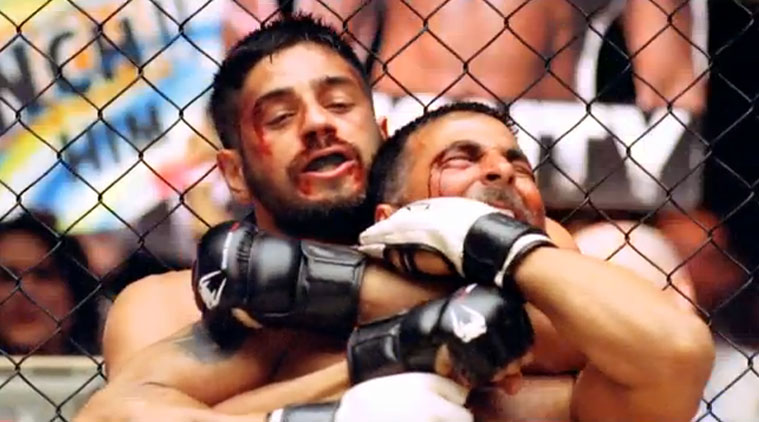Brothers **
Dir: Karan Malhotra.
With: Akshay Kumar, Jackie Shroff, Sidharth Malhotra, Jacqueline Fernandez. 156
mins. Cert: 15
Bollywood has long
eyed up Hollywood for inspiration: since the millennium, it’s redone everything
from The Godfather (2005’s Sarkar) to the David Duchovny heart
transplant saga Return to Me (2004’s Dil Ne Jise Apne Kahaa). Fox’s
high-profile Brothers forms an interesting
case study, reworking material that flopped first time around: Gavin O’Connor’s
Warrior, that 2011 mix of mythology
and mixed martial-arts that sought to provide rock ‘em-sock ‘em entertainment
to crowds whose credit had been crunched. (Sadly, they couldn’t afford the
ticket.) That film was very specifically tied to an America reeling from rounds
of foreclosures and lay-offs; removed of that context, the story can’t pack the
same punch.
The husband-and-wife
team of Karan Malhotra (who directs) and Ekta Pathak Malhotra (who adapts)
doubtless sensed the underlying melodrama would translate easily into Hindi.
Again, the focus is on damaged men – a father and his estranged sons – who can
only truly express themselves through violence, although the Malhotras have
reconfigured the relationships. Their retelling opens with the father (Jackie
Shroff), sometime boxer-turned-greying drunk, emerging from jail, before
introducing “bad son” Monty (Sidharth Malhotra, no relation), a pushover in
this version, and “good son” David (Akshay Kumar), a fighter-turned-teacher
returning to the ring to fund an operation for his sick daughter.
In this version,
there is, in fact, a fourth major character: the absent wife and mother, mere
backstory in the original. As embodied by Shefali Shah, she makes fleeting
appearances throughout the first half – as a photo in a shrine, then as a ghost
haunting pa – before taking centre stage in an extended pre-intermission
flashback. Trilling the haunting lullaby “Gaaye Jaa”, she’s a nurturing
presence being ground down by the relentless roughhousing of the men around
her, and eventually falling victim to domestic violence in the kind of
blood-and-thunder scene no Western filmmaker would dare attempt lest their
fragile handiwork be laughed off the screen.
Considerable energy
has gone into counteracting the whiff of jockstrap that may have alienated some
Western viewers: the inevitable midfilm training montage is intercut with anightclub number where Malhotra shoots guest star Kareena Kapoor Khan as though she were Rita Hayworth’s Gilda. In both locales, you could conceivably sit back
and admire the choreography, not to mention the physiques. Yet the Kapoor
number – isolated razzle-dazzle, connected to nothing in particular – indicates
just how prone the film is to distraction, grabbing for instant spectacle over
longer-lasting effects: it’s the movie equivalent of a fighter setting out on
the tiles when he should be hitting the bag.
Almost all the
second-half drama feels sketchily conceived; that canvas of narrative and
thematic groundwork O’Connor set down before his brothers-in-arms went
head-to-head simply hasn’t travelled. Monty’s inherited alcoholism comes down
to a single locker-room glimpse of shaky hands, and some of the detail is wrong:
we’re told one fighter won a bronze in the 2009 Olympics. (If you can’t win
gold in a year when there isn’t an Olympics, hang up your gloves.) Malhotra’s
rushing towards the fight scenes, which are functional enough, but stripping
them of their emotional scar tissue risks leaving them no more meaningful than
the ABCD movies’ comparably energetic
dance-offs.
Kumar, a goonish
figure in his recent action-comedies, demonstrates a new-found maturity that
becomes him, but these characters never feel like the flesh-and-blood human
beings they were in the original; they’re really just Weebles, to be knocked
down and reset as the narrative template demands. The Malhotra version connects
occasionally – I admired the sucker-punching shamelessness of the final bout,
where David envisages Monty as his younger, helpless self – and it may usefully
redirect viewers to the overlooked original, but in and of itself Brothers feels puny and underdeveloped:
an at best light-middleweight, dancing round in the shadows of a super-heavyweight.
Brothers is now playing in cinemas nationwide.

No comments:
Post a Comment